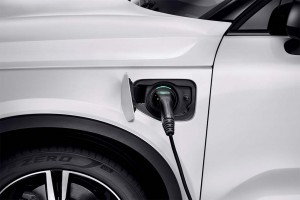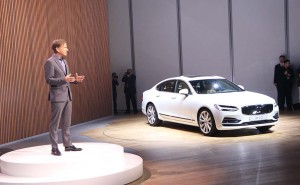Expect to see a flood of pure battery-electric vehicles hit showrooms over the next few years – by one analyst’s count, as many as 101 will be in U.S. showrooms in 2021, with plenty more to follow.
That’s expected to include a number of offerings from Volvo which now says it expects all-electric, or BEV, models to account for fully half of its global sales by 2025. And that doesn’t include the mild, conventional or plug-in hybrid products that will flesh out the rest of the Swedish automaker’s line-up.
“Last year we made a commitment to electrification in preparation for an era beyond the internal combustion engine,” said Håkan Samuelsson, president and CEO of Volvo Cars. “Today we reinforce and expand that commitment in the world’s leading market for electrified cars.”
Samuelsson’s comments fleshed out the plan Volvo announced in 2017 to produce only “electrified” vehicles, starting with new models launching in 2018. The company had not previously given a clear indication of how it saw its mix shaping up, but the latest forecast seems to suggest that Volvo has become increasingly confident about the potential appeal of all-electric drivetrain technology.
(Volvo bringing Ambience to its newest Beijing concept. Click Here for the story.)

Volvo expects that within the next few years, at least half of the vehicles it sells will come equipped like this.
The CEO’s comments were made at the Beijing Motor Show where Volvo and dozens of other manufacturers rolled out an assortment of electrified products. That’s no surprise considering new rules the Chinese government recently enacted that require at least 20% of a carmaker’s sales come from so-called “New-Energy Vehicles,” or NEVs, come 2025.
There’s some wiggle room in the rules, but they largely focus on all-electric, plug-in or hydrogen vehicles. If the industry hits the target it would translate into at least 7 million cars, trucks and crossovers by 2025.
Considering the booming Asian nation is now Volvo’s single-largest market, it’s no surprise that “China’s electric future is Volvo Cars’ electric future,” or so proclaimed Samuelsson, who runs the Swedish side of Zhejiang Geely, one of that country’s most aggressive domestic automakers. Volvo has also taken the lead in development the underlying platforms and electric drivelines for many of the products to be sold by its parent’s other brands, including Geely and Lynk & Co.
The Swedish-based subsidiary already offers a number of electrified models, including versions of the big S90 sedan and XC90 SUV using the T8 Twin Engine, a plug-in hybrid powertrain, as well as the T5 plug-in plug-in powertrain for the new XC40. In a move meant to signal its new strategy, Volvo displayed only plug-in hybrids at its stand at the Beijing Motor Show.
(Click Here for details about Volvo’s hitting Sweden’s streets with an all-new electric truck.)
The automaker’s next big step will come in time for the 2019 model-year when it launches its first fully electric model. It will be a production version of the 40.2 Concept first revealed in May 2016. It shares the same Compact Modular Architecture as the new XC40 crossover, and Volvo initially, at least, will produce the BEV version only in China.
Volvo’s electric ambitions also include the new Polestar brand which this week announced pricing on its first performance car, the Polestar 1 plug-in hybrid. It is expected to add an all-electric sedan, the Polestar 2, which the brand has described as “a stunning electric SUV with a beautiful aerodynamic silhouette.”
By 2021, Volvo plans to have five all-electric models in production, three under its brand, two sold through Polestar.
While the Swedish marque has announced one of the most aggressive electrification programs in the industry it is far from alone.
(Volvo XC60 lands honors as World Car of the Year. Click Here for the story.)
BMW, Mercedes-Benz and Infiniti are planning to fill their line-ups with electrified models, and even Maserati has promised to use some form of battery powertrain on all vehicles from 2019 on. Ford has announced a major ramp-up of its electrification program and has promised to roll out a high-performance CUV, tentatively dubbed the Mach, by decade’s end. General Motors CEO Mary Barra, meanwhile, repeated a promise during an earnings call Thursday to target an “all-electric future,” though she has yet to announce a target date.

